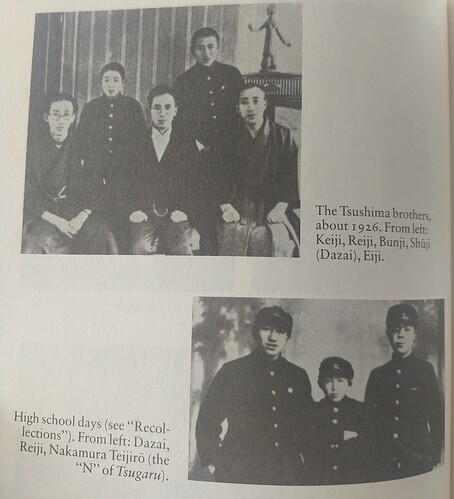I’m continuing with my summaries. All quotes/info are from The Saga of Dazai Osamu by Phyllis I. Lyons, chapters Introduction, The Journey Outward and Childhood and Adolescence this time.
Dazai's family
Dazai’s real family was quite similar to the one from the book. He was a son of a politically active, wealthy landowner and he lived in a nice big house with numerous servants. They were of social importance in the neighborhood, although it’s important to remember it also was a rural area, so Dazai was a rich boy where he was born, but a country boy in Tokyo. The wealth wasn’t old, it’s was built within three generations.
Phyllis I. Lyons doesn’t think this family was especially evil, through, just incapable to help Dazai:
His writings show that his emotional needs were greater than the ability of the family, and his parents and brother in particular, to provide.
Family and school magazines
In Dazai’s youth, he was involved in various small-scope magazines, published either by his school (for example Aomori High School Magazine) or by his family (for example Aonbo – edited by Keiji, Dazai’s next older brother). I wonder if nowadays we would call them fanzines ![]()
But the family games came to an end gradually, as responsibilities began to fall on the older brothers.
And meanwhile Dazai didn’t stop creating.
Death and abandonment
I guess death rate was much higher in older days, but even so, it’s seems quite grim in Dazai’s case:
“So many of my relative have died,” Dazai was to write almost a decade later. “My eldest sister died at twenty-six. Father died at fifty-three. Youngest brother at sixtreen. Third brother at twenty-seven. This year my next older sister died, thirty-four. A nephew, twenty-five, a younger cousin, twenty-one. They were both close to me, but they died anyway, one right after the other this year.”
To make matters worse, two important figures from his childhood, an aunt and a maid, eventually left his life to continue with their own, when he still probably needed them for emotional support.
Zū-zū ben
I mentioned before here that the area where Dazai was raised has a specific dialect, here’s a “joke” about it:
Tradition has it that the inhabitants of this culturally and economically backward Tōhoku region are naturally taciturn. It is widely repeated in Japan that the peculiar Tōhoku accent known familiarly as zū-zū ben (because the su sound of standard Japanese emerges as zu) results from climatic conditions: it is very cold up there, and people have to keep their mouths fairly well closed to conserve heat.
More about fiction vs reality
After reading the passage below, I decided that nobody really knows where are the discrepancies between fiction and reality in Dazai’s fiction. Really, everyone just relied on Dazai’s writing before Sōma Shōichi came and read some school reports? ![]()
When I first read some materials about Dazai I honestly believed it was more sophisticated.
Close investigation of Dazai’s childhood and youth, as well as his family history, relies to a great extent to this [Wakaki hi no Dazai Osamu] and other works of Sōma Shōichi, a writer from Dazai’s native prefecture of Aomori. It is a peculiarity of Dazai criticism that it required an Aomori critic to deal with the primary materials (school record, family registers, etc.) of Dazai’s early life. Most Tokyo critics, for nearly twenty years after Dazai’s death, touched on this life only in the most general and stereotyped ways, drawing from Dazai’s works for their evidence; since then, they have tended to rely on Souma’s work for Aomori material.
That-scene-that-got-spoiled-last-week-already-but-maybe-not-everyone-saw-it-anyways-spoilers-here
So, I’m talking about the unfortunate “rape scene” which was started to be discussed prematurely last week. I was wondering if this was fiction or biographical. As I concluded earlier, nobody really knows, but the matter is mentioned in the other Dazai’s story, too - Omoide. Unfortunately, it’s 作業中の作品 on Aozora, below is the Lyons’ translation (this week spoilers + Omoide spoilers obviously):
Once I entered school, I was no longer a child. The weeds grew thick around an abandoned house behind ours. One beautiful summer day, on that grassy plot, my younger brother’s nursemaid taught me something that made me gasp for breath. I was about eight, and I suppose that at the time she could not have been more than fourteen or fifteen. In my part of the country we call clover bogusa. She sent off my brother, who was three years younger than I, telling him to “go look for four-leaf bogusa,”, and then she grabbed me in her arms and rolled around with me. From then on we would hide, in the storehouse or in a closet, and play. My little brother was a terrible obstacle. Once we were even found out by my next older brother. My little brother had been left alone outside the closet, and he stood there crying. He told on us to my next older brother, who opened the closet door. The nursemaid told him blandly, “We dropped some money in the closet.”
As for this week’s reading itself, I really liked the scene at the end with servants lying about their impressions about 演説. I guess I never get this part of social niceties and I’m always happy when somebody rants about it ![]()
Meanwhile -
I want to make sure if you know where the “rape scene” was by now, or do you want me to pinpoint you a quote when we’re finally on the correct week? ![]() It’s not that big, it’s totally possible to miss it.
It’s not that big, it’s totally possible to miss it.

